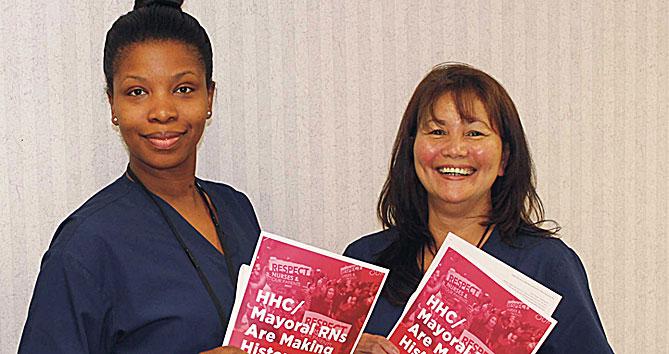Child and Elder Care Fund

The new fund for child and elder care addresses some of the most essential needs of NYSNA members: A toddler whose parent’s work consumes long hours and must be watched and cared for on a daily basis; an aging, sick parent who requires regular care at home, sometimes during nights. Nearly one in four U.S. households provided informal care to a relative or friend 50 years or older in the past year, according to estimates. The hardship in terms of time, worry and expense can be overwhelming.
For NYSNA nurses, whose responsibilities extend 24/7 at their facilities, these burdens of caring for children and elderly family members are even greater.
With these critical issues in mind, NYSNA negotiated – and won – benefits that now establish a Child and Elder Care Fund. This is a very significant step forward for the union.
At the rate of 50 cents per $100 of payroll, or more than $3.5 million annually, the fund will provide new resources to eligible members. Funds increase in step with wage increases.
As with the Fund for Union Training and Upgrading (see page 3), the governance of the Child and Elder Care Fund calls for the creation of an independent, jointly administered fund for the benefit of members, wholly financed by the City but directed by nurses.
For now, members must assess needs in these two areas and make allocations of fund resources on the basis of agreed-upon priorities. Drawing upon the experience of other unions in their administration of like funds will be useful. In the end, NYSNA members, through their own governing body, will be the decision makers regarding child and elder care funding.
Funds for child care
Day care vouchers for children up to five years old are the most prevalent union-funded child care benefits in the U.S. Vouchers exist for both “documented,” that is, licensed centers, as opposed to the “undocumented,” or care at home or in another’s home with pay to care giver. Sliding scales of fund reimbursement are commonly employed by union funds for these services, which largely depend upon two factors: number of household dependents and income.
Some established union child care funds maintain their own child care centers. The Future of America Learning Center in the Bronx belongs to 1199SEIU and has been in operation for 20 years, caring for children ages 16 months to five years. On the other end of the spectrum, family members care for small children on an informal basis, such as a relative providing care, and may by the terms of the child care fund plan receive some funding.
Other factors regarding fund priorities are relevant. It is essential that the views of members are conveyed during the process of the establishing NYSNA’s Child and Elder Care Fund.
The array of benefits available under child care plans is very extensive. Among them are: referral fees for day care centers; family day care, summer camp costs; counseling for college admission and financial aid application; college preparation course fees; tuition costs; arts programs; holiday programs. “Youth enrichment programs” for teens are qualified in some locales.
A benefit can be created around any real child care need that members identify and for which the fund gives a priority.
The challenge is to elicit the ideas of all members with child and/or elder care needs and to keep in place a mechanism for continuous assessment and reevaluation of needs. A competent data system must be developed and maintained that reflects needs are they change with our member demographic. Outreach to members is critical to staying current and making known any changes to fund programs.
Funds for elder care
For hotel workers in the San Francisco Bay Area, an elder care fund has provided up to $150 per month in reimbursement, paid on a quarterly basis. Elder care in this instance is home care provided by a relative. Elsewhere more formal care arrangements have elder relatives with healthcare needs in group settings.
For this program, and others, “elder” care has an expansive definition: the elder may be a parent or grandparent, or a disabled spouse or adult child.
With an aging population, and limited government resources dedicated to care for the elderly and disabled, need for elder care funds is great and growing.
That is why NYSNA, and many other unions, include elder care in benefit funds.
Elder care under the NYSNA Child and Elder Care Fund requires member assessment and careful consideration and assignment of priorities by the governing body within the fund. Elder funds should reflect real need of members.
Democratic process in fund oversight
Interested members will join the fund governing board by nomination and election in a democratic process. NYSNA encourages members to participate in this process, step forward if you wish to serve, and vote in fund elections.
Members have a voice now in the establishment of the fund and its rule of governance, proposals regarding an outline in the setting of priorities and other matters central to fund rules.
Your participation is critical to the process of setting up these important benefits. Your questions are welcome.
Please see the survey in this issue and complete it. You can also access it at www.nysna.org/HHCsurvey.
"I'm excited about the child care services. My son always wanted to go to camp, which is very expensive." - G. Betty Alcindor, RN (at left)
"You have a respite from your responsibility. Financially and time wise, a few hours a month- flexibility with my time- would be good." - Genevieve Leonardo, RN, Elmhurst Hospital Center
"The new fund takes off the financial burden. I have two kids, 18 and 23. When they were younger it was very hard to find a camp that was not expensive. With a little income it could offset the expense." - Sharon Martin, RN, Woodhull Medical Center